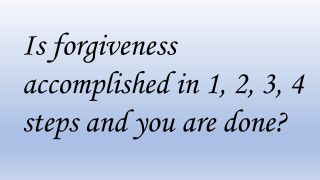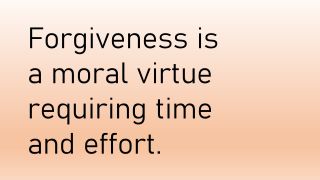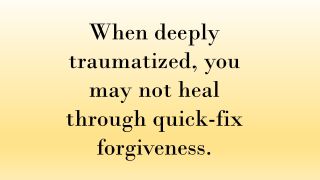Forgiveness
Be Wary of Quick-Fix Forgiveness
A norm is developing that forgiveness can be accomplished in 1, 2, 3, 4 steps.
Posted February 10, 2023 Reviewed by Davia Sills
Key points
- A norm is developing that describes forgiving as somewhat easy, involving a few steps and then, presto, you are done.
- This is a distortion of what forgiveness is; as Aristotle reminds us, forgiveness is a moral virtue that takes time and practice to achieve.
- If you have been traumatized by another's deep injustice against you, beware of the current advice. Quick-fix forgiveness is not the answer.
In a recent conversation with a mental health professional, this person relayed to me that clients tend to run from therapy if they hear that the treatment program will last more than a few sessions. Those needing healing seem to be seeking a quick fix.
Rather than the mental health professional losing the client, I am seeing a trend of compromise, trying to reach a balance between what is genuinely required for psychological healing and a shorter version that might accomplish at least some healing.

What the Internet Has to Say About Forgiving
A quick perusal of the Internet reveals that this quest for quick-fix has entered into forgiveness treatments with such expressions as "easy forgiveness" and "simple forgiveness." As a further evolution of the quick-fix trend, there are scores of entries on the Internet reducing the process of forgiveness to a series of quick steps. The first few pages of a Google search turned up such expressions as "3 steps to forgiveness" and "4 steps to forgiveness." In fact, that same search turned up advocacies for 3, 4, 5, 7, 8, and 9 quick steps to forgive. Only the number 6 somehow has not yet made the list for the quick fix of forgiveness. I have even seen a description of forgiveness interventions that require only two hours of a person's time.
Whether true or false, norms have a powerful way of persuading people to follow them without careful examination. Over time, the power of the norm can be accepted without question.

The Counter Message of Deep Forgiving
This essay is written for those of you who have been treated unjustly by others, and so are contemplating the possibility of forgiving. The intent of this essay is to give a counter message, even though it is not popular, alongside the take-it-easy norms that seem to be overtaking the forgiveness process. Forgiveness is a moral virtue, which means that forgivers must, usually slowly and with continual practice, train the mind and the will to be good to those who are not good to them. As Aristotle reminds us, such training of mind and will is effortful, challenging, and takes time to grow in excellence. To mature in any of the moral virtues takes time and openness to grow as a person.
Yes, forgiving someone who has annoyed you and who has not gravely traumatized you can be accomplished relatively easily. If your boyfriend does not respond to a text message, this can be annoying. If your roommate continually leaves the room messy, this, too, can be annoying. If an instructor gives you a grade of C, and you think you deserve a grade of B on an essay, this can be annoying. Yes, you can forgive these people relatively easily, especially if you have practiced forgiveness in the past and you are familiar with it.

Yet, suppose the injustices are much deeper. Suppose, instead, that your boyfriend of over a year walks away without warning or discussion because he thinks he has found a more suitable partner. Suppose your roommate spreads lies about you and ruins your friendship with others. Can forgiveness in these cases be accomplished so quickly? I do not think so.
Forgiving can be accomplished but without a quick fix. Eventually, you can get to the point of genuine forgiveness under these more serious circumstances, particularly if the moral virtue of forgiveness has become part of your identity, but this occurs only after walking that rigorous path of forgiveness, getting to know that path, being grateful for that path, and again, as Aristotle reminds us, having developed a love of the virtue itself.
The published forgiveness interventions with female incest survivors (Freedman & Enright, 1996), with females so traumatized in a marriage that they had to leave that union (Reed & Enright, 2006), and with men incarcerated in a maximum-security correctional institution (Yu et al., 2021) probably would not have shown the unprecedented and unexpected emotional healing without the participants walking the forgiveness path for 54 weeks, over 30 weeks, and 24 weeks, respectively.
Forgiveness, when someone is traumatized, takes time.
A Final Concern
My concern is that the norm encouraging quick-fix forgiveness will be giving the wrong message and blocking genuine emotional healing from trauma if it becomes routine for people who have not taken the time to examine what forgiveness actually is: a moral virtue that takes time and effort with invigorating success. The norm could end up reducing forgiveness to a set of quick psychological techniques rather than seeing forgiveness more broadly as a process that includes the will to forgive, thinking in new ways about the inherent worth of the one who behaved badly, waiting for even a small change of heart toward the one who so behaved, standing in the pain of what happened to you, and even reaching out (if and when it is safe) in a positive way toward that person. The genuine practice of the moral virtue of forgiving can help you grow as a person, as someone now more sensitive to the wounds in others as well as in yourself, as a person who cherishes love rather than the quest for power over others.
Quick forgiveness surely has its place when you are not deeply hurt. Quick-fix forgiveness becomes intemperate when you are traumatized by others because it offers a superficial and misguided approach to healing. Just because you might feel like running when you hear that to forgive requires rigor, effort, and time rather than smooth sailing is no reason to run from the truth of what is required to heal from trauma.
Long live the truth, despite norms that do not necessarily express the truth. Long live the moral virtue of forgiveness in all of its fullness. May we create a new norm, based on ancient wisdom, that to move toward becoming forgivingly fit can take time and be a time of awakening, of a meaningful challenge to grow as a person, and of discovering a pathway that offers a deep response to the cruelty of others that sets the forgiver free.
References
Freedman, S. R., & Enright, R. D. (1996). Forgiveness as an intervention goal with incest survivors. Journal of Consulting and Clinical Psychology, 64(5), 983-992.
Reed, G. & Enright, R.D. (2006). The effects of forgiveness therapy on depression, anxiety, and post-traumatic stress for women after spousal emotional abuse. Journal of Consulting and Clinical Psychology, 74, 920-929.
Yu, L., Gambaro, M., Song, J., Teslik, M., Song, M., Komoski, M.C., Wollner, B., & Enright, R.D. (2021). Forgiveness therapy in a maximum-security correctional institution: A randomized clinical trial. Clinical Psychology and Psychotherapy.https://doi.org/10.1002/cpp.2583




